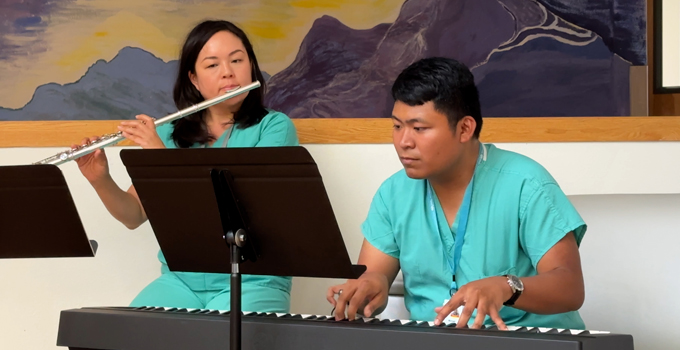One psychiatric resident has decided to combine her two passions – music and medicine – to improve patient wellbeing at The University of New Mexico Adult Psychiatric Center.
For years, Dorothy Bowers Wu, MD, who is a resident physician in the department of psychiatry as well as a classically trained flutist, has researched the benefits of music therapy.
“I’ve spent a lot of my life playing for people in different settings,” she said. “Since the time I was young, I discovered that there’s an incredible power to music and it can transcend whatever they’re going through on a physical level and get them to a happy place.”
During her time as a student at the School of Medicine, Wu took about a month per year to work on various research projects where she explored bringing music to patients’ bedsides.
Wu soon discovered she had quite a few colleagues who were already musically inclined.
“I wanted to access all of the musical talent that lies in the School of Medicine in the faculty, administrators and staff,” she said. “There are people who play drums, guitar, bass, piano and more. We had all these people around already, so I thought we could gather them together and bring these gifts to the patients.”
When Wu approached her mentor with the idea of refining and enhancing the psychiatric department’s existing, albeit small-scale, musical therapy program, he was immediately on board.
“It was in my capacity as her mentor that I came to understand how interested she was in incorporating music into the treatment of our patients in the mental health center,” said Davin Quinn, MD, vice chair for adult clinical services in the department of psychiatry and behavioral sciences. “I saw an opportunity to invite her to become part of our group who are trying to improve the patient experience and help patients heal while they’re hospitalized at the mental health center.”
“Dr. Wu’s expertise in neurologic music therapy has allowed us to take our offerings of music and musical modalities to the next level,” he added.
Quinn said that while there have been limited studies on music in medicine, he’s seen firsthand how music can be used to reduce patients’ stress levels.
“Music has an incredibly powerful influence on how people feel, think and behave,” Quinn said, “But to date, there have been few attempts to study it in a psychiatric hospital setting.”
According to Quinn, there has been an influx of patients experiencing psychiatric crises since the beginning of the COVID-19 pandemic. He added that there has been an increase from 15% to 30-35% of the general population experiencing depressed or anxious episodes, leading to a nationwide increase in suicide attempts across the country.
“Patients are coming in with more severe symptoms and a need for more help, so we’ve been motivated to try everything we can to help our patients and get through the crises they’re experiencing,” he said. “We’ve seen music help patients improve their mood, help control their behavior and help them think through the decisions they have to make.”
Instead of providing a distraction, Wu said music actually helps people come to a deeper understanding of their emotions and behavior.
It’s really amazing seeing the impact music has on patients here.
“It’s amazing seeing the impact music has on patients here,” she said. “I’ve had people who spent the entire day trying to escape the unit come close to me during a performance and start singing along to the songs. In talking to them, I’ve discovered they grew up playing music and how this was a meaningful connection for them.”
Michael Apostol, a fourth-year medical student, plays piano and sings for the psychiatric patients – mostly “golden oldies,” like Dean Martin, Frank Sinatra and Louie Armstrong.
“There were a couple of patients in particular who weren’t really talkative, but when I started playing for them, they just lit up,” Apostol said. “They would hear the songs and would recognize them. They told me they used to listen to the same songs on vinyl records.”
The music, Apostol said, would get patients to reminisce.
“I think that’s one of the greatest things about this music,” Apostol said. “It gets people to remember the happy times in their lives.”
Going forward, Quinn said the plan is for the live musical performances and curated playlists for patients to be rolled out for all psychiatric units.
“We think that this is an opportunity for us to contribute to the science and knowledge around how music therapy can be used to help improve the experience and recovery of psychiatric patients,” he said. “I think this is a wonderful opportunity to both contribute clinically as well as scientifically.”
